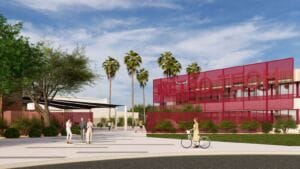As COVID-19 continues to affect millions around the world, individuals and families in minority communities are being faced with the constant problem of financial instability. One of the biggest minority communities currently being hit — the Latino community.
With more than 60 million Latinos living in the U.S., in 2019 according to the U.S. Census Bureau, this community comprises a large part of the population. Currently, there are over 800,000 COVID-19 cases in the community and over 20,000 deaths, according to the Center for Disease Control and Prevention.
States are seeing a rise in COVID-19 cases within Latino communities and the financial effects are troublesome. States such as Las Vegas and California are being hit hard in terms of spread of COVID-19 in these communities, as many residents don’t have the luxury to work remotely. To help aid them during COVID-19, some families are turning to community aid programs.
One program within Downtown Phoenix, known as Friendly House, has been serving the community since 1920, starting as an initiative aimed to provide educational resources to refugees. Since then, the nonprofit organization has broadened to include a variation of programs designed to help those within the community, one of which being the Emergency Services Program. The program provides assistance for those in need, especially now for those who are struggling due to COVID-19.
“Unfortunately, COVID-19 has amplified this need for many. So, through Emergency Services we’re just trying to help as many people as we can. Of course, we have limited funds, but we’ve been able to assist individuals and families with emergency rent and utility assistance,” said Candelaria Montes de Oca, senior director of Family Services.
A large contributor to the rise in cases is the need for financial support. Many individuals within these families are being forced to work essential jobs, sometimes even more than three just to provide enough money to pay rent for the month. While there are COVID-19 relief programs, numerous families within the community are unable to qualify due to being undocumented.
While the organization is doing what it can to help the Latino community, countless families are still struggling to find the funds to help them get by. Although some are able to find jobs, many are still faced with unemployment and a lack of jobs available to them that provide enough money. With rent, grocery, utility and child-care bills piling up, these families are faced with the decision of how and what to pay first.
“We have had families that are a month, two months behind and it’s really difficult for them to come up with the money so they’re coming to us really at their breaking point where they either pay or they’re going to become homeless,” Montes de Oca said. “People are coming with APS bills or SRP bills that are $400 in addition to rent or mortgage that’s $1,500, $2,000. That’s a lot.”
As for the potential spread of the virus within Latino communities, President of Friendly House Jerry Mendoza said the close-knit nature of the community has contributed.
“You might have several generations in one household interacting, so they have more opportunity for contact. Not only that but in some of these families, the brothers are working more than one job and they’re all working essential worker jobs so they’re out there getting contact,” Mendoza said. “They’re the ones in the field, and not just one field, they’re doing two or three different jobs to make sure there’s enough money for the family to get by.”
While the spread of COVID-19 in Latino communities is still a huge problem, Mendoza said there are ways that the community as a whole can try to control it. This includes masking up, practicing solid hygiene, and social distancing.
Mendoza also stressed the importance of community aid programs like Friendly House within Phoenix, and the need for support from the public to continue to provide for communities that are struggling during times of crisis.
“If we can use our collective financial strength, whatever it looks like, to help keep these agencies going that are helping, that’s a big story. That’s a big push for everybody, we all benefit from that,” Mendoza said.




